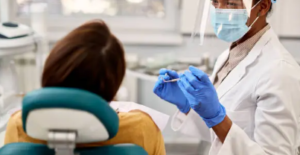Call your emergency dentist immediately if you experience a painful toothache, a knocked-out tooth or other dental trauma. It will allow you to get prompt treatment and help increase your chances of saving your tooth. For an open today emergency dentist in Adelaide, click here.
While most people keep their regular dentist’s number on their phone, having an emergency number is also good. The following are some of the most common dental emergencies and their symptoms:
Toothache
 Tooth pain is a dental emergency and should never be ignored. Pain from a toothache can disrupt your daily life, making it hard to sleep or eat and leading to other health problems if left untreated. Having an on-call dentist in the case of a dental emergency can help you avoid unnecessary medical expenses and get specialized care for your oral health.
Tooth pain is a dental emergency and should never be ignored. Pain from a toothache can disrupt your daily life, making it hard to sleep or eat and leading to other health problems if left untreated. Having an on-call dentist in the case of a dental emergency can help you avoid unnecessary medical expenses and get specialized care for your oral health.
If your tooth is knocked out from a fall or playing sports, this is also considered a dental emergency. If possible, try to retrieve the tooth or pieces of it and bring them with you to the dentist. It is best to handle the tooth by its crown and not its root, and be careful not to touch it too much.
If you have a Health Care or Pensioner Concession Card, you can receive after-hours emergency treatment at participating private dental practices for a reduced fee. You can find a list of participating dentists on the Country Patients’ Dental Subsidy Scheme website.
Broken Tooth
While teeth are powerful, they have their limits. Tooth breakages are often caused by chewing on complex objects like candy or ice, falling accidents or tooth decay. Whatever the cause, visiting the dentist to fix the cosmetic damage and prevent long-term issues is essential. For an open today emergency dentist Adelaide, click here.
To minimize pain, patients should take over-the-counter pain relievers as needed. They can also use ice packs to reduce swelling. If the bleeding is severe, seeking emergency dental care is essential.
Patients experiencing a broken tooth should rinse their mouth with warm water several times daily to remove bacteria. They should also cover sharp edges with dental wax or chewing gum to protect the cheeks and tongue from injury. They should also gather pieces of the tooth and wrap them in gauze to bring to the dentist. If a tooth is split, the dental professional may need to remove it altogether, although root canal treatment can sometimes save part of the tooth.
Knocked-Out Tooth
Knocked-out teeth are some of the most severe dental emergencies that require immediate attention. The good news is that most knocked-out teeth can be saved. When a tooth is knocked out, it damages the nerves, blood vessels and supporting tissues. People must be cautious when handling a knocked-out tooth because contact with it could cause further damage.
In most cases, a knocked-out tooth will require a root canal treatment to preserve it. Leaving the tooth untreated has severe consequences, like the remaining teeth shifting out of their natural positions and other health problems. For an open today emergency dentist Adelaide, click here.
Infections
An infection occurs when germs enter a body and multiply, causing illness, tissue damage or disease. They can also cause potentially life-threatening complications, such as sepsis. Both bacterial and viral pathogens can cause infections. Bacterial infections can be caused by bacteria such as staphylococcus and streptococcus, while viral infections can be caused by viruses such as influenza and herpes simplex.
Ignoring wisdom tooth pain can lead to a fluid-filled cyst, which can become infected and need emergency treatment. Infections can also be triggered by gum diseases such as periodontal disease and gingivitis.
Spreading odontogenic infections affect a broad range of demographic groups but are overrepresented amongst the socially disadvantaged, who have increased dental decay secondary to drug-related hyposalivation and have limited access to public dental care. Patients with spreading odontogenic infections require an interprofessional team that includes oral and maxillofacial surgery; ear, nose and throat surgeons; anaesthetists; and intensive care unit staff. For an open today emergency dentist Adelaide, click here.
